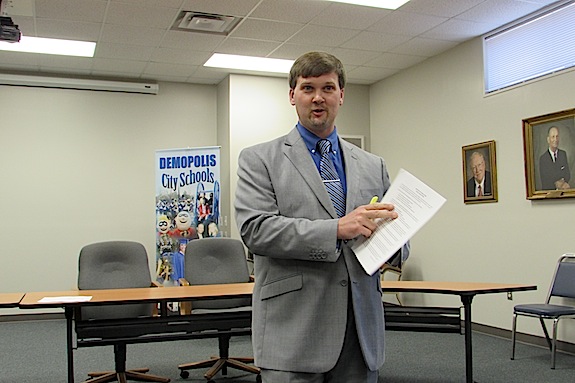Demopolis holds public hearing regarding virtual school
 The Demopolis City Schools system is putting into place a policy for a virtual school. As part of the procedure, Kyle Kallhoff, superintendent, led a public hearing Monday to introduce the policy to the community.
The Demopolis City Schools system is putting into place a policy for a virtual school. As part of the procedure, Kyle Kallhoff, superintendent, led a public hearing Monday to introduce the policy to the community.
The proposal will be presented to the Board of Education at its meeting Monday, April 18, for approval, Kallhoff said. Once it receives the okay, all the procedures will be hammered out and put into place.
“I would like to have something (in place) in the fall,” he told the small group of parents and teachers attending the meeting.
The need for a policy was triggered with legislation passed in 2015 requiring every system in the state to have a virtual education option in place by the 2016-2017 school year. The legislation, however, leaves a lot of flexibility within which each school system can work.
The purpose behind the virtual school option is to provide quality education to all students in Demopolis and the surrounding area and to develop a virtual platform for students in grades 6-12, Kallhoff explained.
“There are a lot of procedures to be considered once we have the policy,” he said.
The proposed policy states eligibility requirements for students and spells out how attendance and academic progress will be monitored.
Ideally the virtual school will provide a way to keep “certain kids who cannot handle the school day” from dropping out.
The virtual school option also offers full time enrollment to those who don’t attend Demopolis schools because they are home schooled, attend church schools or family or medical circumstances prevent it.
It can provide a blended approach for students who are interested in additional courses not offered locally, the accelerated student who wants to work ahead or elective courses for students who are home or church schooled.
Students enrolled in virtual courses must take the same state tests as those in classes on campus, he continued.
Kallhoff said two students in Demopolis are enrolled in another system’s virtual school, and the state money for their education goes to that other system. He wants the opportunity to offer virtual education to students in Demopolis instead of sending money elsewhere.
Already Kallhoff and Demopolis High School counselor Bill Barley have been investigating vendors who offer virtual education containing the required Alabama course content. Three options are available, but two of them won’t work in the local system, he said. They involve buying a curriculum and using local teachers or purchasing a curriculum with no teacher feedback.
The option Kallhoff prefers is having an Alabama-certified teacher work with the student. It is also the most expensive.

